Everyday stories from extraordinary people
“HAE has brought so many beautiful and empowering people into my life that I otherwise would not have met.”
— Person living with HAE

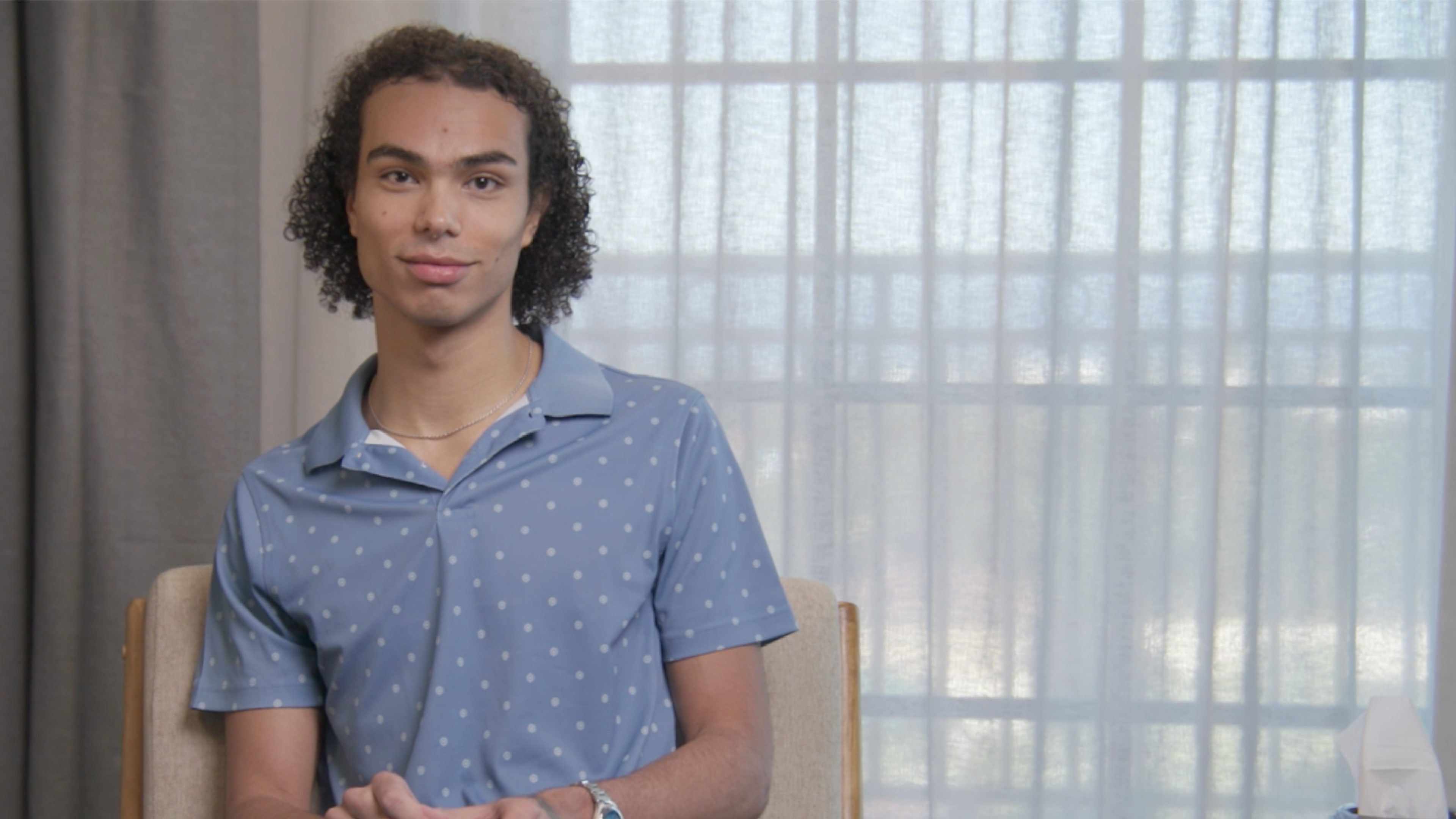
Meet Kobe | Asking for what you deserve
Acceptance is a funny word. You have to accept your circumstances. There's sometimes I've had to reach out to my friend and say, I can't make your birthday dinner because I'm suffering an attack right now. And that just is what it is. I won't be in the... and for me, I think about the big life of it all. If it's 21st birthday or your 18th birthday and I've missed this big life event, and I'll never be a part of those pictures because I wasn't available this one evening.
It's easy to get caught up in feeling like, “oh, why me?” Or “how could this be different?” Or “if only I didn't have to”. Do you have to accept a lower quality of life that you didn't ask for? Absolutely not.
And that's why I think advocating on any level that is available to you is imperative. It's because access is not the same as it was 10 years ago, and it will not be the same in a decade if we continue this way, and that's for the better. So, no. Do you have to accept terrible, terrible side effects and life altering circumstances and missing big family moments? Absolutely not.
I don't want to cope with it.
We are on an upward trajectory, and we have been for a long time, and that's beautiful. But it doesn't happen by accident and it certainly doesn't happen with the absence of effort. There are so many people trying so hard to continue to improve our lives and the quality of them at any given moment.
My advice for our community to continue this progress is to stay persistent and steadfast in the understanding that we deserve a life that is regular to any person.
Meet Kobe
Asking for what you deserve
“We’re never alone. This is such a rare disease that you often feel like the weirdo in the room, but you’re not on your own.”
— Person living with HAE

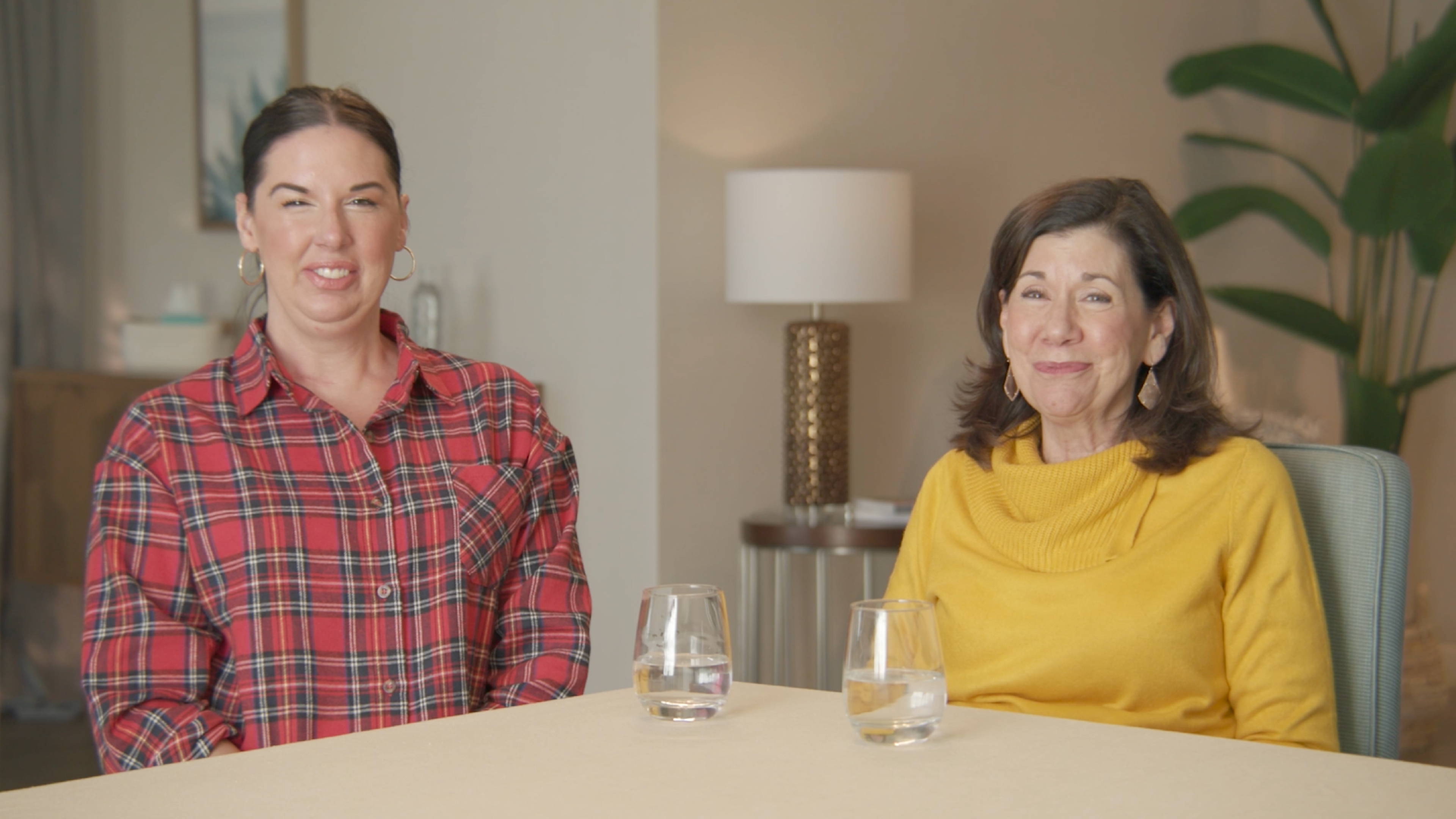
Meet Jaime and Janet | Finding comfort in family
Hi, my name is Janet and I'm the mother of Jamie
She's the first person that I've ever known that has HAE. She was diagnosed eight years ago, and she's the first person in our family that's been diagnosed with this disease.
The thing that I wish people understood more about HAE is its unpredictability. She has no idea when she's going to experience a swell and how it's going to affect her or what she's doing, and that there's just so many unknowns about this disease right now.
I also want to say that I'm very proud of the way that she handles it because like I said, it's very unpredictable. One thing I wish Jamie understood about my role as her mom, is that whether she believes it or not, I always have her best interest at heart. Even though she might get tired of hearing me. My role as mom has kind of changed since her diagnosis because I think I'm a lot more protective of her, and I don't know if she gets tired of me nagging at her.
JAMIE:
I don't feel like my mom nags. I think she's, like she said, she's acting from having my best interests in mind and I'm, I'm very stubborn, so I don’t… she'll offer to drop me off at the door, but at the same time, I don't want her to, because I want to be able to walk like a normal person. And so I would say that is one thing that I do give up in daily life is just even something as minor as that.
JANET:
I think it's important that you let your doctor know how this disease impacts you so that they have a better understanding of the disease.
She can tell 'em, we can go in and say she's having an HAE attack or to go in to the doctor and he just knows this, this, and this from what he's read in the book. But if she explains to him, “this is what happens” and “this is how I react”, then I think that gives 'em a better education than just what they can read in a textbook.
JAMIE:
She's advocated for me when I couldn't advocate for myself.
Meet Jaime and Janet
Finding comfort in family
“Keep looking for ‘your people’ in the HAE community and let others help.”
— Person living with HAE

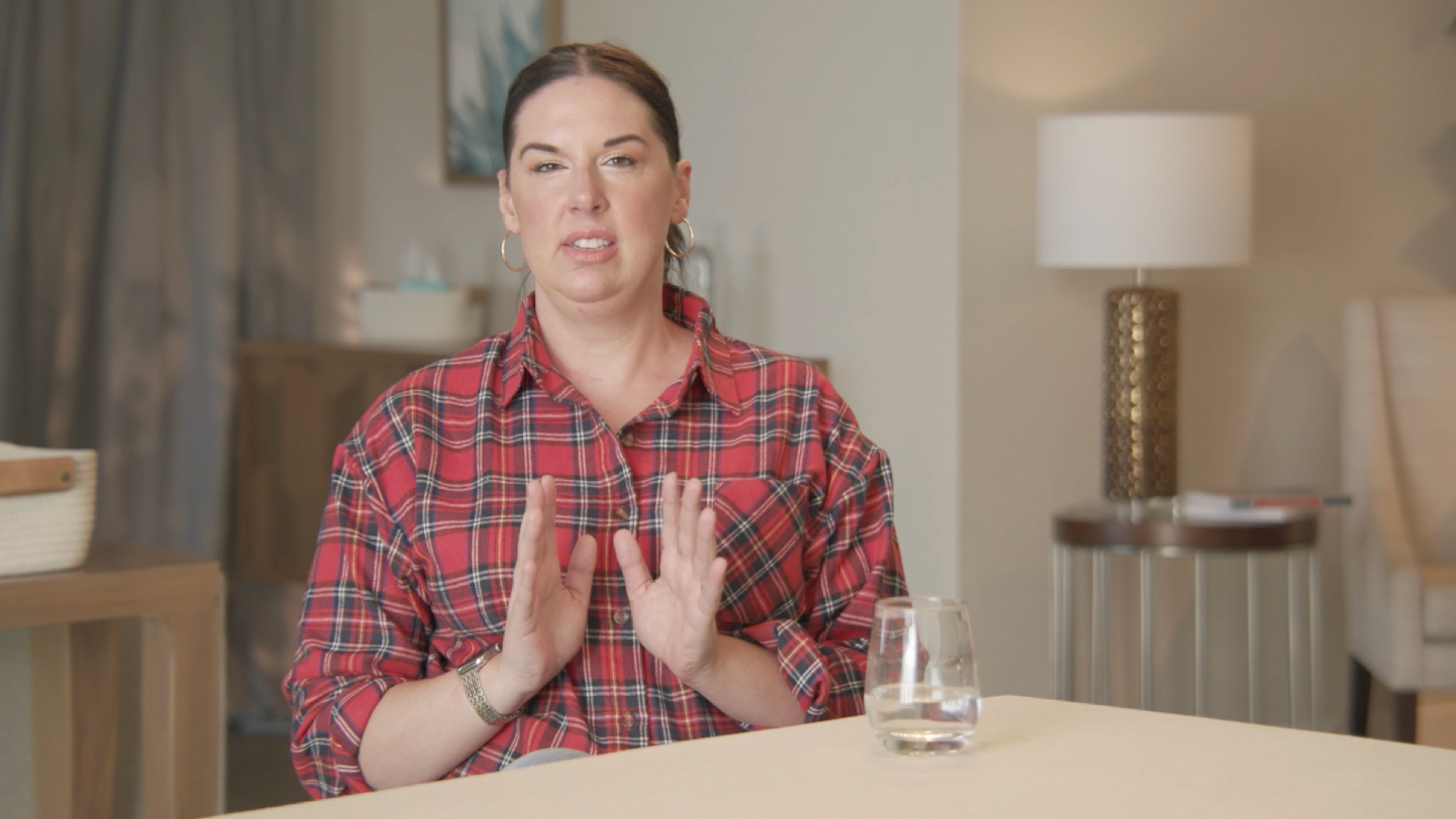
Meet Jaime | Giving yourself grace
I think that anyone that's diagnosed with a chronic illness is going to have to accept that there will be some changes to their daily life. Whether or not they choose it to be a negative thing, or a positive thing depends on the person and depends on their outlook in life.
I'm from Oklahoma, so our summers are brutal. So, if there's any type of function that involves going outside, then I automatically, that's just, I'm sitting it out. It's even hard sometimes walking from a parking lot into a store in the heat. I mean, it's just that much of a trigger.
I have to have pants in five sizes because I never know what size I'm going to be when I wake up, or what size I'm going to be at the end of the day.
I'm very lucky because my friends and family don't let my HAE affect my relationships with them. And they understand if I need to cancel because I'm swollen. they understand if I need to sit something out because it’s hot and I am going to swell up like a blimp. And they understand it's just not a good day and I don't feel well. So, I'm very, very lucky.
I would tell someone with HAE who's having a bad day or feeling overwhelmed that it's okay to stop and take a deep breath, and that that's probably one of the best things you can do for yourself is to know when to just stop and take a deep breath. Because HAE can be exacerbated by stress. And while it's so easy to freak out with this disease, it's just as important to remind yourself to breathe and to be patient with yourself and to give yourself grace when it comes to feeling overwhelmed.
Meet Jaime
Giving yourself grace
“I have gained a whole new family from all over the world because of HAE.”
— Person living with HAE

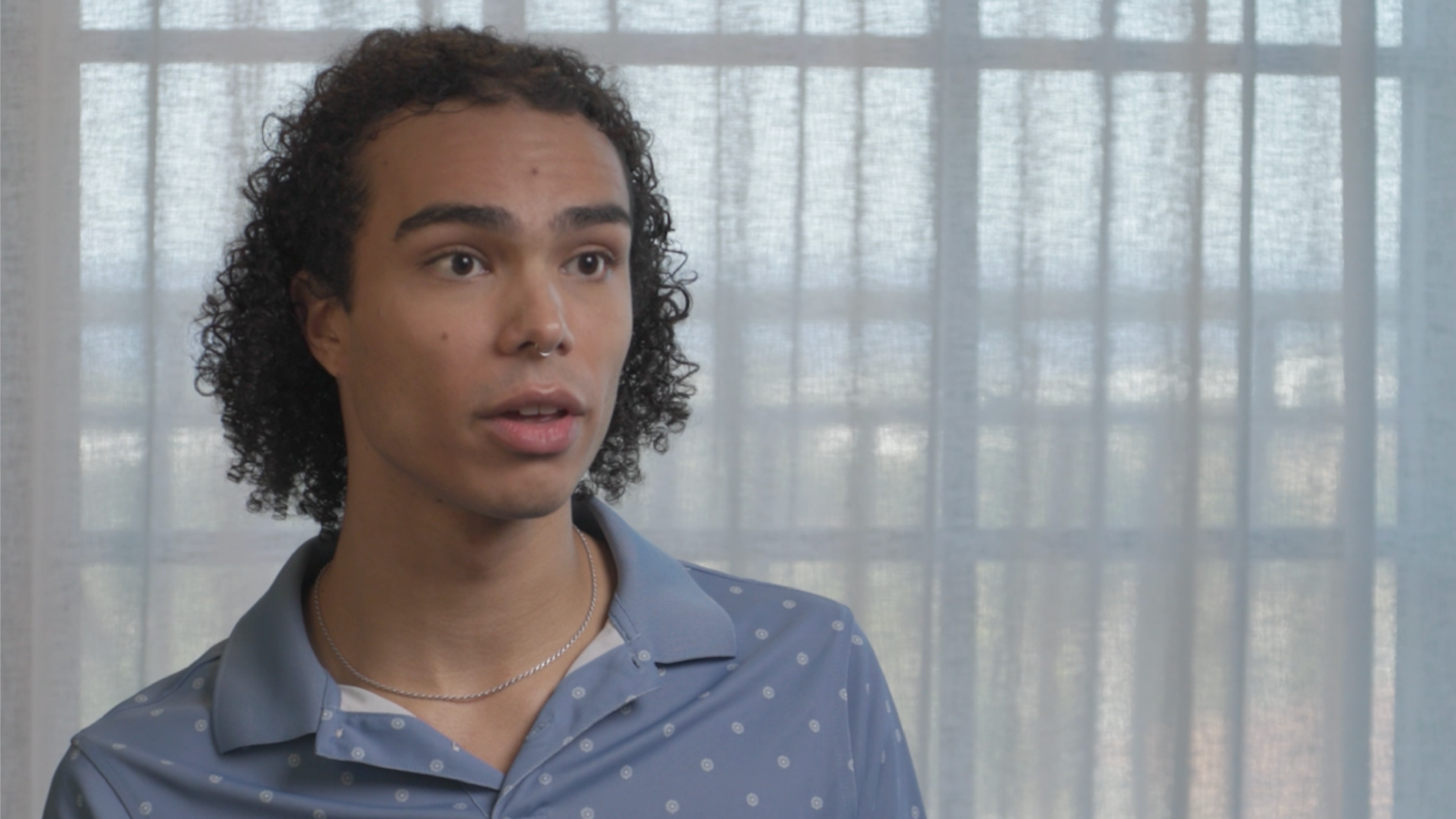
Meet Kobe | Power in numbers
Community is the lifeblood of any movement of any like-minded people; getting together and chatting is the only way anything has ever gotten done, ever. I've been fortunate enough to have been grandfathered into the HAEA and the summits and all those fun community building experiences because my mom started going when I was very, very little.
And so, to grow up and look around and see people that you know, that suffer, so to speak, but that have positive stories in real lives outside of this disease and jobs and families and stories to tell, and anecdotes to spin that have nothing to do with this experience that affects us all adversely.
And you realize that on a human level, you can come together with that empathy and then kind of forget that it's the pressing circumstance that brings you together, if that makes sense.
I'm like all my HAE friends. We don't chat about HAE. But I know these people through this, but not because of it. And I don't only know them for their disease. My HAE is not the same as my mom's or my brother's, or my cousin, or my other cousin, or my auntie or whoever. We all have very, very different experiences with it, but the very fact that we all have a piece of paper that says, this is what we experience… brings us together on that level.
There's a fundamental level of 'I see you' and 'we see each other' that comes with this kind of community.
Meet Kobe
Power in numbers
“There’s always someone to support you. We’re stronger together.”
— Person living with HAE

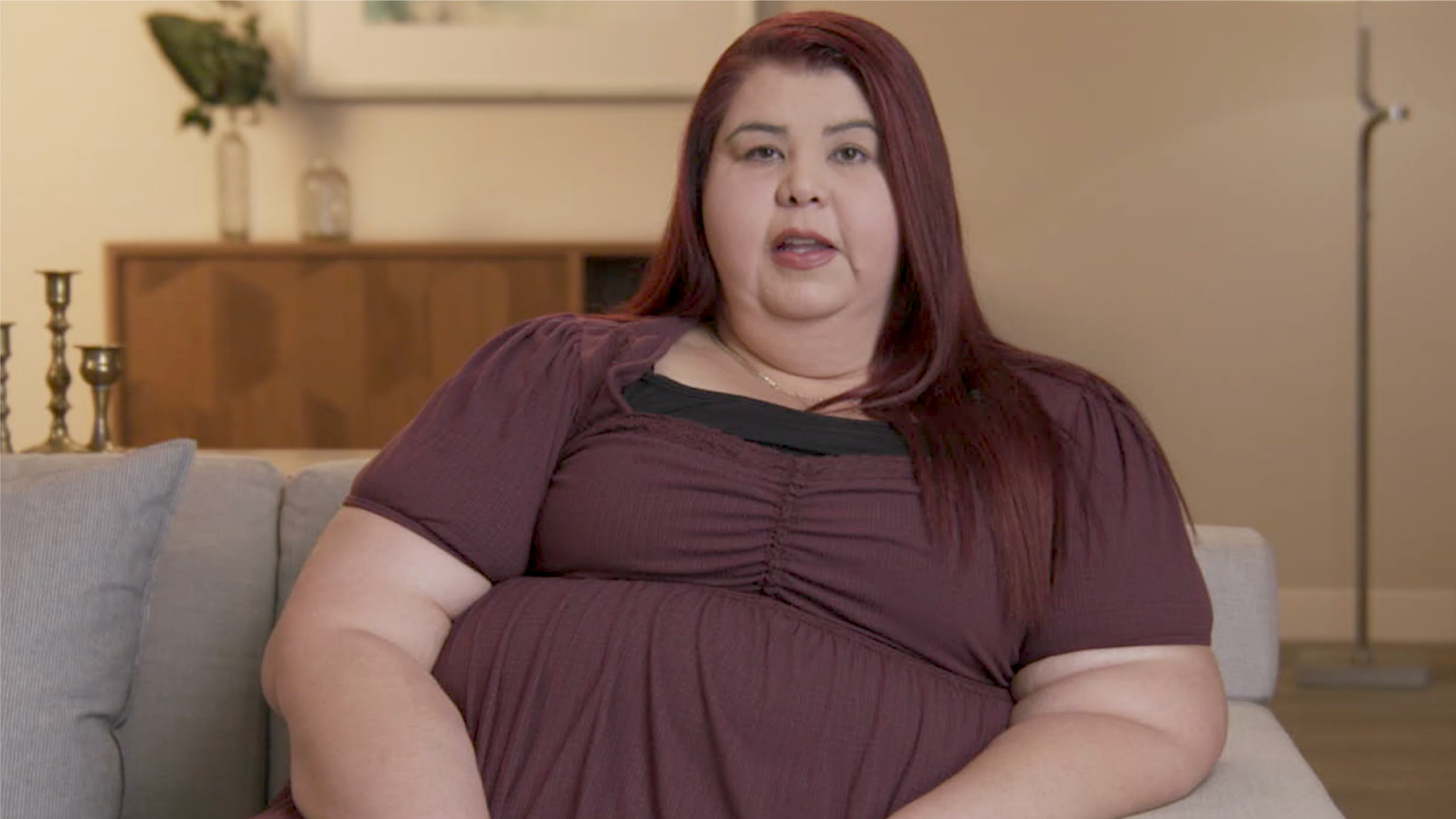
Meet Jennea | Not giving up
I believe my biggest change I had to do with my life when it came to HAE was… I had to stop planning things with my family just because of the disappointment. Still to this day, my kids hate the fact that I cannot make any solid plans for anything because of the HAE, just because it's unpredictable when you're going to have a swell. So, it's very hard to commit to plans. So, my kids hate that about me. I never tell them we're going to do anything until the last minute.
We have always had such a difficult time having somewhat of a normal life. I think we end up accepting the little things that we have to accept just because... I couldn't tell you that I could go be able to walk out the house without meds or think about a family vacation, planning it around when I'm going to get a medication shipment.
It just became a normal thing that I've had to just deal with in my life, and it's became a normal to me.
Don't give up when you feel that you're just at a breaking point. We've all been there, but we all can get through this. If you fight for yourself and just advocate, get medication, talk to doctors, go to programs, do whatever you have to do to fight for yourself.
There's plenty of us out there, obviously, through meetings, through community dinners. Get out there. Find your people. Without your people, you feel like you're solo. You're not solo. There's plenty of people out there that are willing to help you and just give you a sense of not being alone, because we're not alone.
We have a big community, and we all have big hearts. We all want to help each other and be there to support each other.
Meet Jennea
Not giving up
“We teach each other how to be advocates for ourselves, our families.”
— Person living with HAE

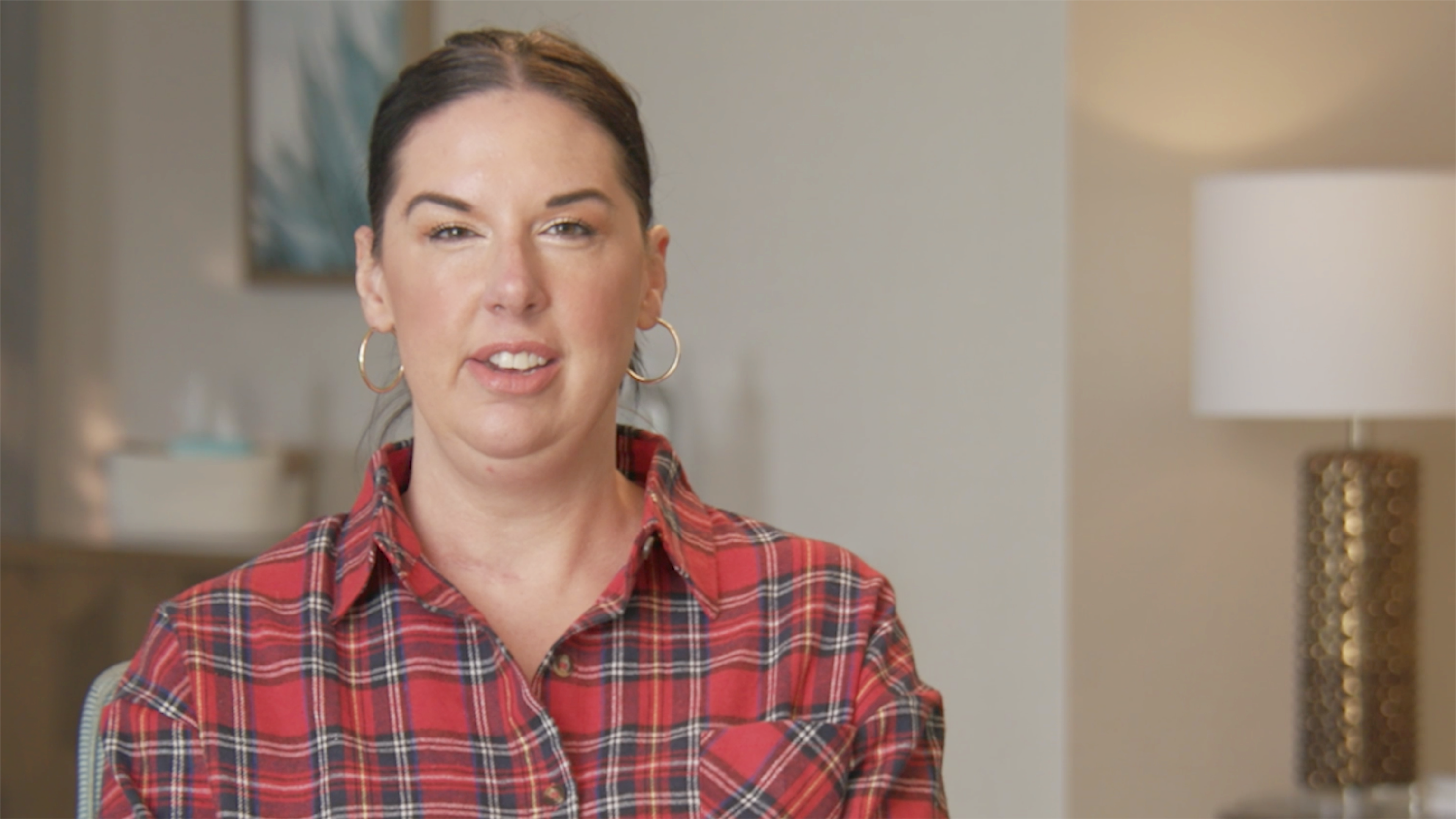
Meet Jaime | Doing what you love
If I could give anyone with HAE, and newly diagnosed with HAE, any advice it would be to be patient and to do as much research as you can, because a lot of times you're going to have to be your own advocate in the beginning because it's so rare.
It's okay for people in the HAE community to want to be able to do the things that they were able to do before. I personally love to play golf. In the summertime, I just… I’ve accepted I can't do it. And so, that's part of researching and seeing what's available out there to give ourselves hope that there is something that could enable us to do the things we loved and had to give up again.
I would love to be able to lay out in the sunshine again. I would love to be able to just be outside and enjoy it and not have to worry about how long it's going to be before I start swelling up.
My hope for the future of the HAE community is that we can all find therapies that benefit us and allow us to have the best possible quality of life that we can. And I understand that that is going to look different for every single one of us because it's such a rare disease that it affects every single one of us differently.
Meet Jaime
Doing what you love
“We learn from each other’s experiences.”
— Person living with HAE

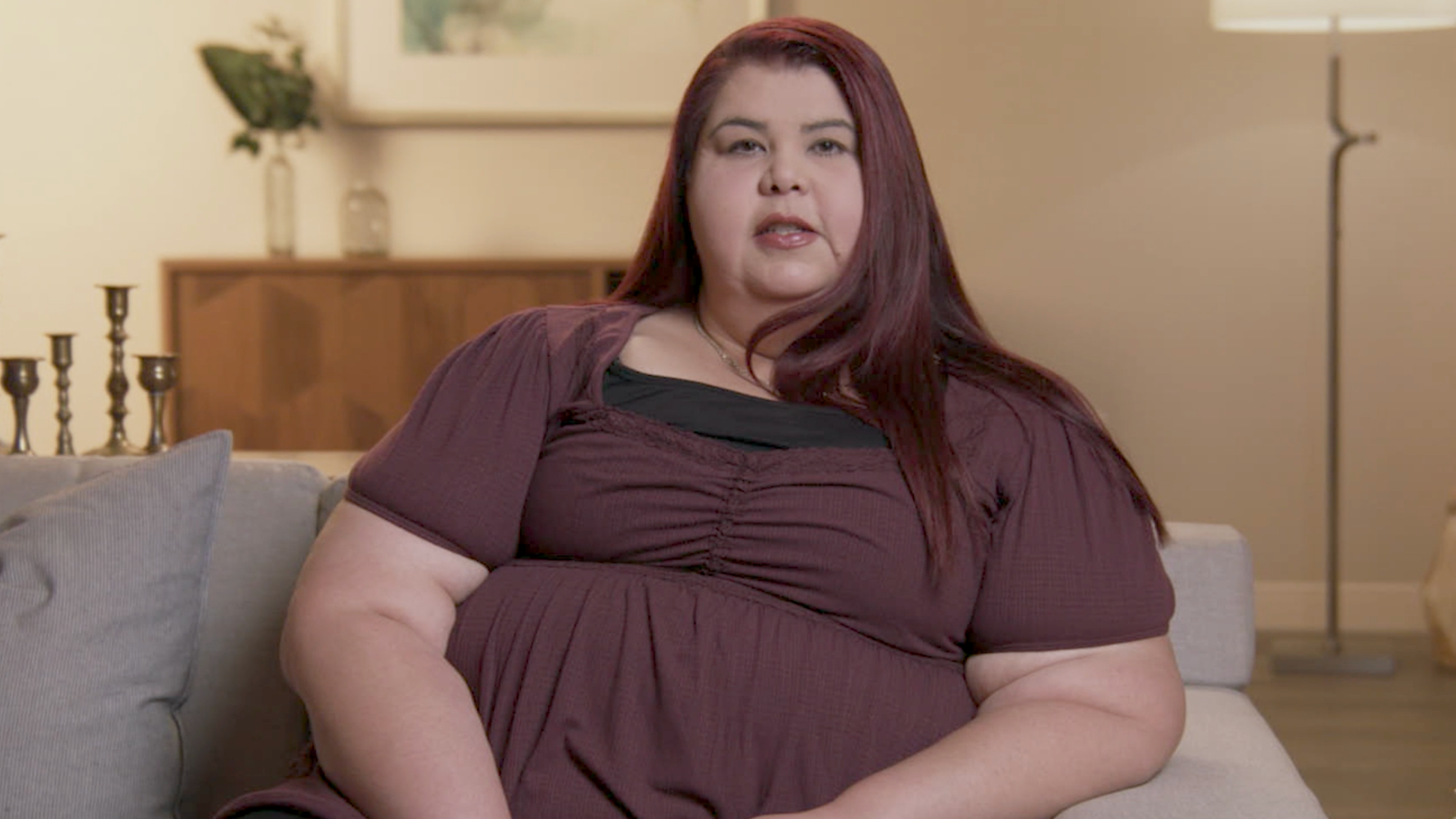
Meet Jennea | Being your best advocate
It's important for the people with HAE to be the biggest advocate because we know our own bodies. We know what we need, and if we don't advocate for ourselves, we can't expect anybody else to advocate for us.
I feel like if you don't let others around you know, you have HAE, I feel like you're hiding a very important part of your life. And also, if you were to get sick and couldn't breathe, how is anybody going to know if you're not open and honest with them what you have? And they need to know what you need them to do for you when you can't speak for yourself.
You have to be open with it. Whether it's you dating somebody, or whether it's your friends, your coworkers, definitely in the stressful situation. Your coworkers need to know that you have medication that you need to be treated with.
I definitely feel that you need to speak up about what you want to do, even though you do have HAE speaking up, bringing it to light, speaking about it to other people, can help you get the advice that you need for you to accomplish goals that you want to set for yourself. Speaking the goals out in the universe. There's somebody out there that's going to help you achieve those, and you're just going to feel that much more better about yourself.
Meet Jennea
Being your best advocate
We would love to hear from you! If you’d like to share your experience with us or have your photo be featured on this website, connect with us.
SHARE
Join us for candid conversations about the unique challenges of life with hereditary angioedema (HAE), including personal experiences from other community members, expert insights, and practical coping strategies to support well-being.

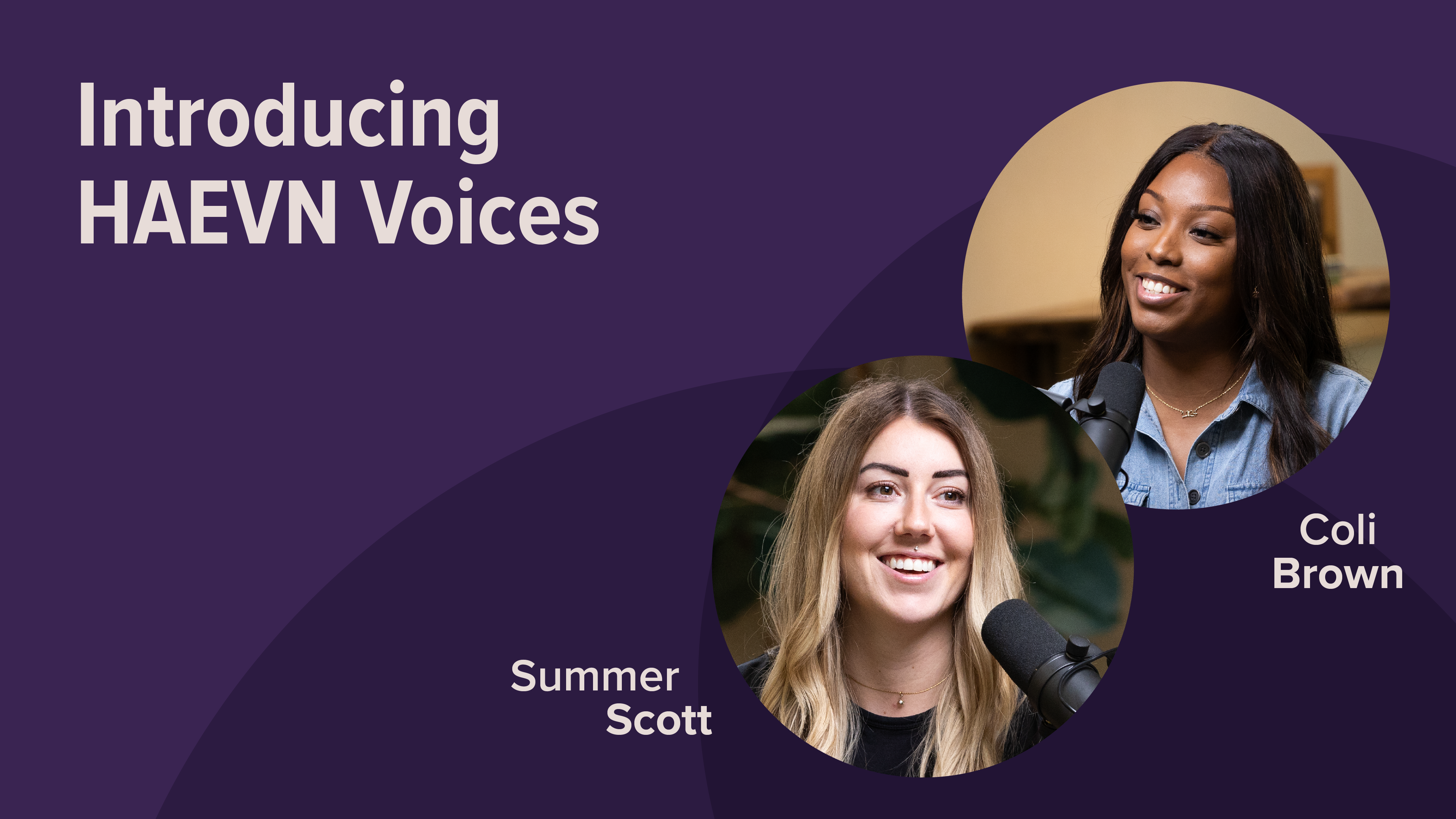
Episode 1 | Introducing HAEVN Voices
Welcome to HAEVN Voices! Tune in as Summer and Coli share their personal journeys with HAE, including how it’s impacted their work, relationships, and daily lives but also sparked a passion for building community.
Well, we’re here.
COLI:
We are.
SUMMER:
HAEVN.
COLI:
I know. I’m excited.
SUMMER:
Yeah, me too. We should probably, you know, get into it and explain to people what this is, why we're here.
COLI:
Yeah, my name is Coli.
SUMMER:
I'm Summer. We're both patients of hereditary angioedema, and I think it's crazy to know that we're here in this spot today, being able to be in a position to talk about it and let the world know A. what hereditary angioedema is but also, you know, share experiences and allow people to know that they're not alone in this really rare disease.
COLI:
Yeah, I feel like it's a really huge milestone not only for the HAE community but for us.
SUMMER:
I definitely have had my issues with mental health throughout my process of being diagnosed with this disease. And I think that's why this is so important because it helps shed light on that side of things, as well
So, you know, to talk about the implications and people's experiences with how they were diagnosed and how it presents, that's one thing. But the mental health side, I think it's…
COLI:
It's not talked about as much.
SUMMER:
It's not, and it's so important.
It feels really lonely if you don't have a good support system.
And so, I think, you know, going through the process of grappling with that and, you know, like what therapies are available to me, how can I find a community of people that understand or who do I have to talk to? And I think there was a very long time early in my diagnosis where I didn't feel like I really had access to that.
And I had to spend a lot of time, I guess, reflecting on having this disease. What does that mean for me in my future? And am I going to let this impact me? How open am I going to be about talking about it? Am I going to tell people I have this disease?
COLI:
It's okay to be angry because accepting HAE is being angry sometimes, is grieving it, is, you know, trying to figure out how you can now bring this a part of, you know, my life. If I accept this, you know, how am I going to go forward in life with it?
SUMMER:
So, I know that our diagnosis stories are quite different. Do you maybe want to share your story a little bit?
So, my diagnosis actually came when I was like 17. And I feel like that was like in the prime, not only the prime of my life, but I feel like that was, more of a time where your personality is kind of getting formed. You know, you're really trying to learn about yourself and really get to know yourself better.
And I feel like during that time, HAE kind of formed a lot of who I am. But I actually had my first swell when I started my first job.
And I really loved my job a lot. Like, I really loved it. You know, this is the first time I had a job, this is the first time I’m making money for myself. So, I took it very serious.
And, by the end of that day, I was extremely tired. At the time, I didn't know what it was. Once I got home, I just fell into the bed, went to sleep, but I woke up with like a sharp pain in my foot.
My foot was extremely swollen. We went to the emergency room, got there, of course the doctors did know what it was. Their first idea was like let's just put you to sleep and then, you know, we're going to, like, try to figure out what's going on. So, I can still remember maybe like 4 or 5 times waking up and seeing, like, one limb, like one more limb swelling. That's how HAE introduced itself to me at 17.
What about you?
SUMMER:
I mean, my story is definitely very different than yours. I was slightly older. I was in university. Mine didn't present in the same, like, extremity swelling like yours did. Mine was very throat based, so I was actually sitting in a university classroom during a lecture. I had eaten some nuts.
And I just remember, like, I'm sitting there and my throat and my tongue are starting to swell. And I turned to the girl next to me and I'm like, “is my tongue swollen?”
COLI:
Yeah. You never had this happen before?
SUMMER:
No, never. And like, I never had any allergies or anything. So it was so bizarre. And within like minutes, like my throat and my tongue were completely swollen. So, I had to get rushed to the emergency room.
So, there was a nurse that was on duty in the emergency room and she, you know, was just finishing school. And she had read this weird little, tiny report in a textbook about this, you know, this hereditary angioedema.
And she said to the doctor, maybe try looking at this, like I don't know, like she's swelling, so maybe there's something there. It's edema.
And then the diagnosis comes in after tests. And I just remember sitting with that and being like, what just happened? Like a second ago, I thought maybe I was allergic to almonds, and I could settle with that.
But now you're telling me I have this hereditary disease and it just it shook my world completely.
I think a lot of people with the disease grapple with that, right?
And I think as patients, we go through the gambit a little bit. We have good days and bad days. And it impacts life differently each day.
COLI:
Life is meant to be lived. It's not meant to be sitting here worrying about what you have, if you can be able to sustain it the way that you can, do it. But you have so much left to live. Keep going and don't let it hinder you.
SUMMER:
And it's really hard because you come to these challenges where you need to make a decision. Do I talk openly about the fact that I have this, how it impacts my day-to-day life, my travels?
COLI:
Yeah. I had this conversation with a coworker, and we were just randomly talking. This is during a time where I didn't really tell anybody. And she was like, oh my gosh, Coli, you need to tell everybody your story is amazing. And I was like, no, I would never.
She's like, no, I really think that you need to do this. So, she tells me to tell everybody I agree to it. And this is a pinnacle in my life to where I'm in front of these people on a Teams call, of course. And I'm telling my story that I never really told anybody.
This is a lot for me. And I remember after telling that story, I hit the end button at the meeting, and I just start bawling. Like, all these emotions just start pouring out and at one point I was like, why am I crying? Another point is like, oh my gosh, I'm so sad. Another point is like, I'm so happy that I got it out.
And after that, I started getting like messages and they were like, “Oh my gosh, like this really helped me for my life,” and “I would never forget this, thank you so much for telling your story.” And at that moment, I was like, you really don't have to have HAE for you to be impacted by somebody's story. You can just be a living human being with, you know, issues in life.
We're all human. We all go through things.
SUMMER:
I think that's why, again, this is going to be really nice because we get to talk to people who are sharing the understanding of the burden of the disease, right? Whether it's medical professionals, caregivers or parents whose kids are going through this, other patients, people who are just in the industry and, you know, have different viewpoints. I think it'll be really interesting just to feel that sense of community through conversation.
This was obviously born out of a place of trying to create a safe haven for anyone in the community.
I'm super excited to have other perspectives on the show. Obviously, you and I, we could talk for hours about it.
COLI:
I feel like this safe haven that we kind of have right now. I feel like this is a really nice, safe space that we have, so I’m really feeling the effects of that. So just imagine, you know, what everybody else would or will feel when they were able to hear this. So I'm loving it already. HAEVN.
Episode 1:
Introducing HAEVN Voices
Welcome to HAEVN Voices! Tune in as Summer and Coli share their personal journeys with HAE, including how it’s impacted their work, relationships, and daily lives but also sparked a passion for building community.

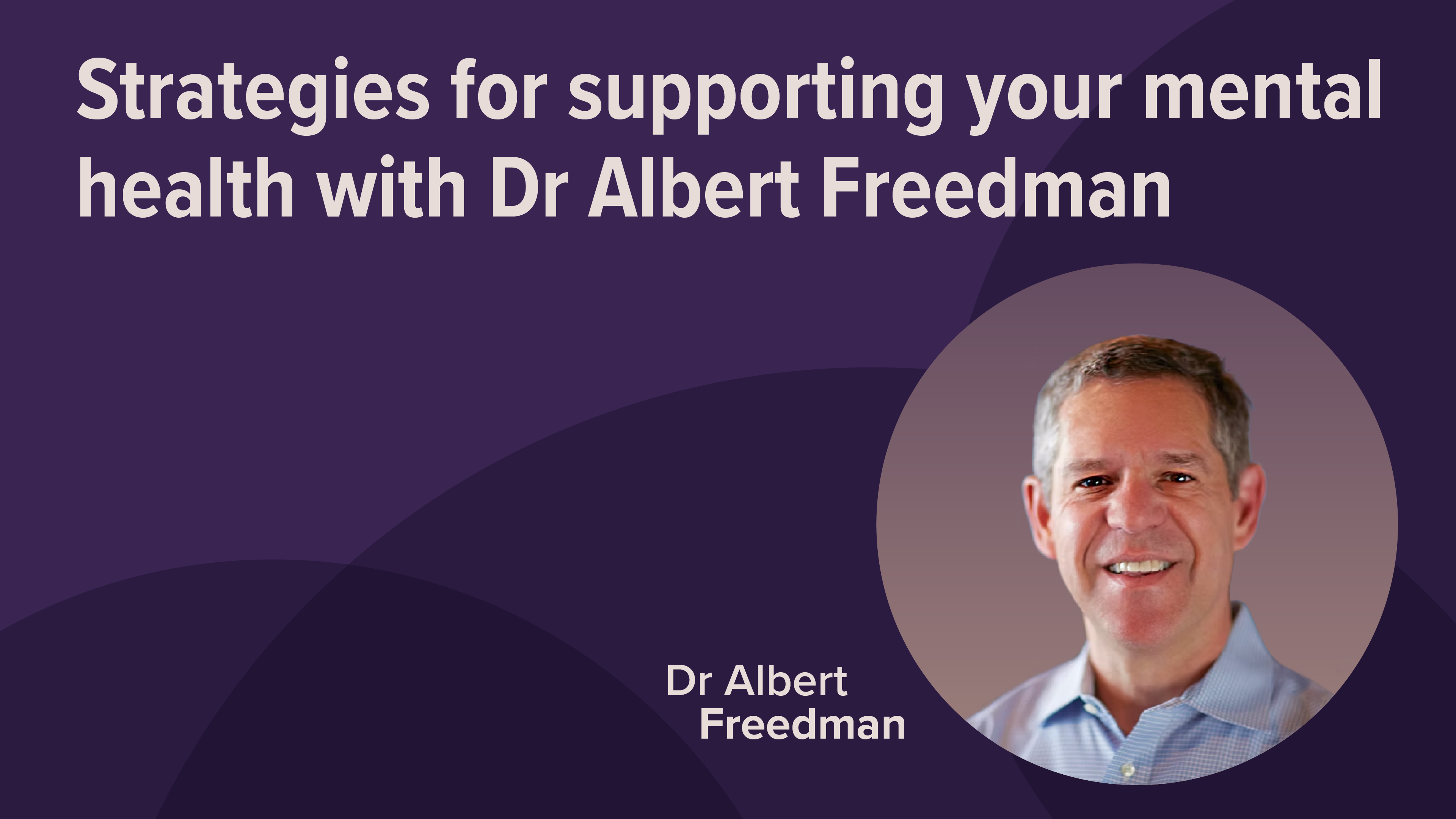
Episode 2 | Strategies for Supporting Mental Health with Dr Albert
Welcome to HAEVN Voices, a series that aims to address the unique mental health challenges associated with managing a chronic, rare condition like hereditary angioedema, also called HAE.
COLI:
With these conversations, our hope is to promote emotional well-being and create a sense of community by sharing personal stories, expert insights, and practical coping strategies for living with or caring for someone with HAE.
SUMMER:
Let’s get into it.
Hi everyone and welcome to HAEVN Voices. I'm Summer.
COLI:
And I'm Coli.
SUMMER:
And today we are talking with Dr. Al Freedman, a psychologist specializing in supporting patients and families affected by rare diseases, disabilities, and medically complex conditions. He's joining us today to help us understand and navigate the impact of HAE on mental health and emotional well-being.
Big welcome to Dr. Freedman. Dr. Freedman, question for you. I'm curious, what led you to a career that specializes in supporting families affected by rare diseases?
DR. FREEDMAN:
Thank you, Summer and Coli. First, thank you very much for having me. I'm honored to be here. And to answer your question, I was in training to be a psychologist, and as I was finishing my doctoral training, uh, we had a baby boy named Jack, who was born in 1995 and born healthy. But at the age of six months, baby Jack was diagnosed with at the time an untreatable neuromuscular disease called spinal muscular atrophy or SMA.
And we were told that baby Jack would live only for a year from the time of his diagnosis. Thankfully, Baby Jack grew up and lived to the age of 26. He passed away three years ago, but we were very, very lucky to have him for 26 years. And his life was full of challenges, but also full of some very special gifts.
Because of my son, I chose to specialize in helping other families who face similar challenges with rare disease.
So I consider it a great privilege to do this work and consider it a privilege to honor my son through my work. And I'm happy to be here today with you.
SUMMER:
Well, we certainly appreciate you taking the time to speak with us. You know, as people who suffer from hereditary angioedema, it could be very mentally challenging. You know, there's a lot of mental health issues that go along with it. And so, you know, it was really important for us to have you on the show so we can talk to someone who understands it.
So I'm curious, based on the work that you've done, how have you felt the similarities have been between different rare diseases. Are there a lot of similarities? Is it quite different?
DR. FREEDMAN:
Yeah. Uh, each of these rare diseases that, uh, that I help with are very different in terms of the medical challenges and the medical symptoms. HAE is entirely different medically than my son's condition, SMA. But the psychological challenges and the types of stressors that we face within the rare disease communities, there are many commonalities.
First, the diagnosis of a rare disease is a life altering moment for many of us. I myself went from having a healthy baby boy one day to having a baby who wasn't expected to live another year four days later. That was our diagnostic journey. It was abrupt, and it really was a trauma for me, and for my family. And whether that experience of diagnosis takes four hours or four days or four years or fourteen years, it's very complicated, and we find that the life that we thought we'd have isn't the life that we do have moving forward.
So the adjustment to the new world that you find yourself in is very complicated for many. I call it the twilight zone. I felt like I'd been launched to the twilight zone when our baby was diagnosed into this place that nobody else possibly could understand. And, uh, it was very disorienting, and it took me quite a while to get my feet under me.
And I'm a psychologist. So, the experience of a diagnosis is the first area that I see that requires special support and is very common across rare diseases. The second area that we all have in common is the life of uncertainty. The symptoms that the two of you experience with HAE can be unpredictable.
And it's hard for all of us to live not knowing what's going to happen. What's going to happen next? Um, I drove around for 26 years with a suitcase of clothes in my car and a toothbrush, because we ended up in the hospital with baby Jack quite often over those 26 years. And it's a hard way to live.
Living with uncertainty is, is hard. The uncertainty takes many forms. There's the existential. What is going to become of me and how do I fit into the world? Is there a place for me in the world? What does this mean in terms of my life?
So living with uncertainty is a common challenge. And then there's dealing with the healthcare system. If you have, as you do, a disease that's invisible most of the time or much of the time, that presents different challenges.
And where do you find hope? And how does community help? So, these are the common themes across rare diseases and they cut across all rare diseases in all countries.
SUMMER:
Of course, you know, there's something very comforting about that statement that there's so many similarities amongst rare disease. There's also the scary aspect of it. I mean, both Coli and myself, we, we suffer from the disease. Stress is a huge factor in hereditary angioedema and, you know, facing stress on a daily basis is fairly inevitable.
So when that becomes, you know, part of the triggers or part of the reactions, that can be very hard . And so, you know, what kind of coping strategies are there when it comes to people with HAE or any rare disease dealing with those daily uncertainties that you mentioned?
DR. FREEDMAN:
Yes, the first thing we all need, whether we have a rare disease or not, is connection. And when we have a rare disease, it's very common for, for our families to feel isolated. We're a person with a rare disease, we often feel different than everybody else and we feel isolated. And because of that, we sometimes don't have enough connection.
So I'm not sure this falls in the category of quote, coping strategy, but I start with the basics. We all need to have a sense of connection with our family, with our friends, with our work and with others who share the same challenges. So, I often talk and assess a client's need based on that spectrum of connection or disconnection and strive for connection.
That being said, in terms of, quote, coping strategies, everybody's different. And for some people, meditation is really helpful. For other people, listening to music is helpful. For other people, taking a walk is helpful. For other people, going to a football game or watching TV is helpful. For other people, talking to a therapist is helpful.
For some people, exercise is helpful in whatever form you can safely exercise. So, it's not a one size fits all list, it's a find your route to what works for you list in terms of coping strategies. With rare disease, I find it remarkably powerful when people have each other.
And I'm finding as a psychologist that there's as much power or more power in the group experience than the individual experience because there's so much knowledge, there's so much compassion, there's so much support, and there's so many shared experiences that are rare to everybody else but not rare to you if you're a member of this club you didn't choose to join.
SUMMER:
That's a really good point. That kind of leads me to talk about how difficult it can be to open up about your disease journey. And Coli, I know this is something that you and I have chatted about in the past, how we have very different approaches and stories when it comes to our comfort levels with speaking about the disease, especially early on when we were diagnosed.
Do you want to maybe talk to Dr. Freedman about your experience and just what do you do when you're someone who isn't maybe as comfortable opening up about the disease in the first place?
COLI:
I think the biggest thing with speaking on something that I was newly diagnosed with, I think at first, it was more of me getting more of an understanding of it. Because once you bring up the subject, it's okay. So, what about it? Can you tell me more about it? And I think at the beginning, it was more so what do I have and me understanding what I actually have and how to explain it to others that didn't really know.
And I think that kind of goes into my next question, because the biggest thing that did help me was, was my caregiver, which was my mom. She really implanted inside of me that, um, I was not abnormal and that I could do just as much as anybody else and that I shouldn't hide, uh, you know, what I had because it was a part of me.
So you expressed that you had a son with SMA and thank you so much for sharing that story about him. But being that you did experience that within your family and possibly talk to patients that have rare diseases, can you speak about the common challenges that rare disease patients have and how those challenges can be overcame within the family between the relationship between the patient and the caregiver.
DR. FREEDMAN:
Yeah, sure. And just to comment on what you said, when you're newly diagnosed, it's very different. In the beginning, I went to my first conference with other SMA families a few months after my baby was diagnosed. And I remember thinking, well, if I don't go to the registration table and sign in and get a name tag, maybe this will all go away.
You know, like I, I first had to accept the fact that this was real for me was step one. And thankfully I did sign up and get my name tag. And then step two was watching the other children and the other families and accepting the fact that I really had to be a member of this club. I didn't choose to be.
You didn't either. And then you take steps in. It's like when you go to a swimming pool and stick your toe in the water and then you sit next to the water and put your feet in. It goes in steps for most people. Their comfort level with interacting about your disease and talking about it. Because you just don't know what to do for a while, you know.
COLI:
That's a great analogy.
DR. FREEDMAN:
Yeah, and the person that I work with professionally who's new, uh, newly diagnosed has very different needs than the person who's gotten used to it and has some practice. To answer your question, Coli, um, being a parent is a hard job no matter what.
It's a crazy job to be a parent with or without a rare disease. It's a challenging job. With a rare disease, it's even more challenging and as a dad, I'll tell you that it wasn't an easy 26 years, but I have no regrets about my son's journey. It was really hard to take care of him because of all of his medical needs.
And one of the common challenges I see when I talk with kids and adolescents and then young adults is, how do they do what most kids need to do, which is to move away from their parents rather than be dependent on their parents? Every year, at that same conference that I was afraid to get the name tag from, now I'm, for 20 years, I've been facilitating support groups for the kids, and one of the first questions the children ask me, I'm the only one in the room without a wheelchair in these groups, and the kids will drive their chairs around and we play a game and, and they'll ask me, um, Dr. Al, how can we get our parents to stop worrying about us so much? And these are seven, eight, nine, 10-year-olds. And then when the teenagers come for the teenage group, it's Dr. Al, our parents are driving us crazy, you know, like, which happens with teenagers and their parents anyway, but it's harder sometimes for kids to be able to be independent.
You want your independence as an adult and, and everybody does. These are the kinds of challenges, these are normal developmental stages that parents and kids go through that are complicated by the challenges of rare disease and the need for parents to be more involved. Then they would have been without the rare disease and the young person growing up and wanting to be like everybody else and wanting their independence.
And the parents are just so worried, you know, and there's good reason for that with a condition like HAE and a condition like SMA. Of course, parents are worried. I'd be more concerned if a parent wasn't worried. It's a matter of how much worry and how does it play out in the dynamic.
COLI:
I'm sure that's like a huge process for parents to kind of, you know, contemplate and try to figure out how to get through it. From your perspective, how important is it for caregivers or parents to like maybe seek mental guidance or help with the experience?
DR. FREEDMAN:
I think every parent I know who's had a child with a rare disease needs support. Whether or not it's formal support from a licensed mental health professional is another question. Sometimes that's needed and helpful and sometimes it's not needed. Support can come from many places. The other parents who had kids like Jack were probably the most valuable sources of knowledge and support early on for me rather than the therapist or the doctor.
And sometimes a parent will benefit from mental health support and sometimes a parent will benefit from peer support from their rare disease community and other parents. Some of the other parents that, that our kids grew up together from 25 years, 30 years ago, we're still friends and we will always be friends with or without our kids because we helped each other, support each other through a lot of challenging situations. It's like another family. I consider this community an extended family, both the parents and the kids. So, we all need support.
SUMMER:
That's a good point. I really like your quote. You know, we didn't choose to be a member of this club. I think that's so valid and hearing that is nice because I think daily we go through that gamut, right? Of, I didn't choose this life. Like, why? Why is this my life? And I think a lot of people suffering from HAE, especially, we deal with the emotional journey that comes with having a rare disease, and you know, it's that feeling of hopelessness or frustration, sadness, sometimes it's the loss of your former self or the things that you can't do that others can do and that can be a very lonely place.
And I know that's been my experience of that emotional rollercoaster that comes with the day-to-day challenges of dealing with a rare disease. Is that something that you encounter a lot in your practice?
DR. FREEDMAN:
It's exactly what I encounter in my practice. Everything you just described, Summer, is what I encounter in my practice, that existential level. Why me? How do I fit in the world? What does this mean for, for my life and my family? And how do I manage all this? It's very, very common. And it's also the reality that our attention in rare disease has to go to our medical needs and our physical well-being first, and the attention to mental health within rare disease often lags behind the attention to physical health because you have to be alive before you can talk about how you feel about it.
I, I would tell you that for 26 years, I was so busy managing the day-to-day challenges, keeping my son alive that I didn't have a whole lot of time to talk about how I felt. I was wanting to make sure that the ventilator was charged up and that the wheelchair lift on the van was working and the nurse who was supposed to help overnight was going to show up or I would be the nurse.
And you also with HAE have a lot of uncertainty. You have a significant disruption when you have swelling, you have symptoms. And the unpredictability and the disruption of those symptoms and your attention to your medical needs has to be first and the rest come second for obvious reasons. They're no less important, they're just different types of important and I feel very obligated to support families like yours and mine because there's so few of us who, uh, have experience in this arena.
And so I, I call my son professor Jack cause I learned a lot in school, but I wouldn't be on here with you if I was a PhD psychologist and I hadn't had Jack, professor Jack, train me and taught me what I need to know to help other families who face these challenges.
SUMMER:
Of course. Well, I think that's a really good point. And it's nice too, because sometimes you forget about those caring for somebody with a rare disease. And as much as, you know, I want to turn the conversation to those of us suffering from the diseases and, you know, the mental turmoil that we go through, anyone that is within the circle of someone suffering from a rare disease is also going through an array of emotions, whether it's your spouse, you know, caregiver, parent, or even just other friends and family. Having someone in your circle that is suffering from some sort of rare disease, it affects everybody and it's important for those who are caregivers to take care of their own mental health or to at least have the resources to know how to care for themselves as well as the person they're caring for.
DR. FREEDMAN:
That's right, Summer. With a rare disease diagnosis, really the whole family receives the impact of that diagnosis.
So I wholeheartedly agree with you, that the caregivers of people affected by rare disease need as much support and sometimes more than the person who's diagnosed with the condition, depending on the circumstances. We're all in this together.
COLI:
I did want to kind of go into more of the community aspect part of it. I know that a part of my community is now Summer. I met her this year and, um, just the whole HAEVN community that we now have and we're trying to communicate with the HAE community. Can you tell me more about your experience with the diagnosis of your son and how you guys were able to build a community and how important it is for other rare disease patients, no matter what they have, to build a community.
DR. FREEDMAN:
There are many types of communities that we, with a rare disease, can receive support from, and some of the challenges. Accepting that we need help and that we should allow other people to help us. We all want to be independent. We have our work communities, our school communities where kids go to school, our neighborhood communities, our faith communities.
And the community you're referring to is a special community for our families with rare disease. It's the rare disease community. Fast forward 29 years later, this community is to me part of my family.
And I'm very much a part of the community and feel very proud with how everybody supports each other. But the most important thing is the emotional support because we all have this unusual thing in common.
I found a lot of support and a lot of fuel came into my tank emotionally. As soon as I felt I had found other people who were, who had also been launched into the twilight zone.
These people in the community helped me to navigate so many unusual things that I wouldn't have been able to do myself. But most importantly, Coli, uh, our community understands each other and supports each other and there's such strength in numbers.
To me, community is, is vitally important to all of us affected by rare disease.
SUMMER:
Thank you so much, Dr. Freedman. This was incredible having you here chatting with us. You know, it means a lot to us. You, you understand as best as anyone can understand, you know, what we're going through and being able to work with someone who really has experienced it firsthand. That's impactful to our community.
So, I just wanted to say thank you so much for joining us today. We've made a friend and we just, we've learned so much, really appreciate your time.
DR. FREEDMAN:
And I've made two new friends and what a privilege to get to know both of you and to support you and your community in your journey.
COLI:
Thanks for joining, really appreciate your input.
DR. FREEDMAN:
Thanks for having me.
SUMMER:
Thanks for listening to HAEVN Voices. HAEVN Voices is sponsored by Ionis, and participants are compensated for their time.
COLI:
The opinions shared today are specific to our individual experiences, which may not be representative of all patient journeys. If you have questions about your health, speak with your doctor. Stay tuned for more enlightening discussions and stories from the HAE community.
Episode 2:
Strategies for Supporting Mental Health with Dr Albert
Summer and Coli are joined by Dr Albert Freedman, a psychologist specializing in rare diseases. Dr Freedman speaks about the holistic impact of HAE and provides practical advice for supporting mental health and emotional well-being.
Meet the hosts

Stay connected
Sign up for information about HAE, including resources to help support daily life, tips from the community, news on treatment options, and invitations to share your perspective.